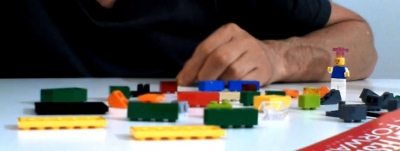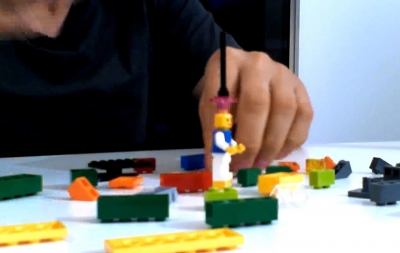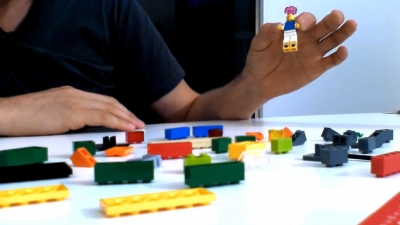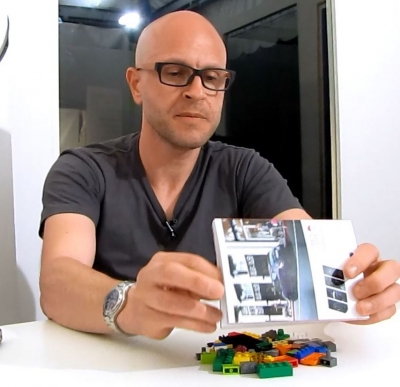Slavko Martinov: The antidote to Propaganda? Question everything!
June 24, 2013 12:00 am Leave your thoughts
Slavko Martinov http://slavkomartinov.com/ has spent nine years working on one of the most original documentaries to have ever been produced about the media and manufactured consent. Propaganda http://propagandafilm.net/ took centre stage in an international debate before it was even released. The film appeared on YouTube on 18 July 2012: it was presented as a film that North Korean opponents purloined and made public to let the West see how North Korea portrays and describes the consumerist society of the Capitalist world. The documentary is presented by an anonymous professor from North Korea who takes the viewers on an eye opening journey, showing the contradictions, the lies and the truth about the world we live in.
The anonymous professor is not a North Korean but a member of Martinov’s crew: his name is Eugene Chang http://propagandafilm.net/Propaganda/eugene/ and he is a South Korean expat living in Christchurch, New Zealand, where the documentary was produced. Yet, the consequences for Mr Chang, Slavko Martinov and Mike Kelland, the co-producer of the film, have been bigger than expected: Mr Chang has been excluded from the South Korean community and the Church in Christchurch, and despite all the efforts that Slavko has been doing to clear their names, the three of them are still accused of being North Korean agents and spies. Slavko feels very responsible for a predicament that is affecting the lives of his colleagues. Slavko is a kind person who pursues a quest for truth with a strong and sincere dedication.
I met him in Italy, during the Biografilm Festival, where Propaganda received a special mention by the director of the jury, Ed Lachman. Martinov was also nominated as best guest of the festival.
When he arrives at the room where I am waiting, I ask if he feels apprehensive about the upcoming interview.
He laughs and replies: “I am not scared’ I have a beer!”
I explain that the method of interview (Lego Serious Play) is not a psychoanalytic session but merely a search for truth “‘which is typically subjective” he adds.
My goal is to gain an understanding of his perception about information and propaganda and to learn about the views that led him to realise Propaganda.
“What is information?” I ask.
He stares at the bricks and then turns them all upside down, leaving them all separated and detached from each other.

“All these pieces are information’ If you ask me what information is, it really makes me think that if everything I have turned the other way was information as it’s presented, my natural instinct is to turn everything over and examine it from underneath, or sideways or back to front, or upside down’ That’s how I get to the truth. I just don’t accept information as it’s given to me.”
`”What are those signs on the small bricks next to the human figure?” I ask pointing at the two small yellow bricks

He looks at them and says “I think the common perception would be that these were eyes”.
“So what are those eyes made of?” I enquire.
“It depends who this person is’ If he is standing on the eyes, is it suppressing eyeballs? Controlling eyeballs? Controlling information eyeballs? It could be Reuters or it could be any kind of network'”
He picks up the human figure and looks at it more closely before continuing:
“Although he is smiling’ It’s kind of a pernicious gaze, isn’t it? It’s like he says ‘I own these eyeballs! I will tell you what to see. In which case the construct of information would be turned over and’this person on the top’ complete with the antennae”.
He adds the antenna on top of the head of the human figure.
“‘And then it would be transmitting to those eyeballs, which are at the bottom of their feet’

“What is propaganda?” I now ask.
“Are you talking about propaganda as a construct or Propaganda the film?”
He starts taking and I mock him “I don’t want the answer you have already given to others. Build it!”
He spreads the bricks around and then picks up a booklet and places it in front of the bricks.

“Propaganda is this, that you can’t see it. Those who construct propaganda hope this is what you see, they don’t want you to see anything.”
Removing the booklet he says “My goal is that you see it and ask who is making it, who is it? Who’s selling this to you, or telling you something or try to influence you’ And then, piece by piece, you start taking it apart, looking at it, asking questions, talking to each other’ Why I am being told this? Who benefits’ sometimes it’s not easy to take it apart’ and you use the word, propaganda, not public relations, not informational diplomacy or advertising or marketing’ Propaganda, because that’s one construct. Taking apart what you are sold, information, is the antidote to propaganda: you take everything apart, and start asking questions about it’ that’s the antidote.”
While he talks he takes apart the model he built brick by brick.
“Some propaganda is good. For example, a propaganda campaign in Africa to try to get people to start using contraception to avoid [transmitting] AIDS would be a good thing, you know. So this is what I do with information: I take it apart, and I examine it and I look at it really closely, up close, upside down, back to front, inside out’ and I talk to people about it as well: did you hear this thing yesterday?, and who is benefitting from this? What do I get out of this? Why I am the one who seems to be fighting these wars and for whom? So, information is taken apart and I think that even entertainment’ If you are enjoying something, [you should] still discuss it and talk about it. Don’t just let it happen, don’t just leave it aside, don’t be lazy – take the time to think about it. And not always in a negative way, not always assuming that something is bad’ but discuss things, because human beings are very clever wonderful creatures, and I think that we are living in an age where we are so horribly distracted and it’s very easy to get distressed’ Maybe we are becoming not so smart or are underutilising our brain power and our ability to analyse things and deconstruct things. But we’are smart and we should challenge ourselves and each other to take things apart and look more closely”.
The booklet that Slavko used to hide the bricks and to represent propaganda is made of a different material than that representing information: he did not build a wall with the bricks but he took an external element, made by paper, and placed it in a way that obscured the bricks.
“The substance of information and propaganda is different. What is this booklet made of?” I ask him.
“This construct represents those who construct propaganda: international diplomacy, information and public relations, marketing. It represents what they want you to see and what they don’t want you to see. They don’t want you to see the word propaganda for a start. They don’t want you even thinking [about] that word because it has negative connotations. This (referring to the booklet) represents the language they want you to use because there’s no really negative connotations with advertising, or marketing, or international diplomacy: these are nice words. So even language is dangerous, and they use those words to influence you or guide you or control you.”
“So how can we take that booklet away?” I ask.
“Question everything: everything you read, see, or hear. It’s a simple thing and everyone is capable of doing it. Sometimes you do it without thinking and [sometimes] all it takes is for friends or someone in your family or your class to say What do you think? Just the simplest thing, or Did you read about it today? and it starts a conversation. For instance, a couple of weeks ago, our Foreign Minister appeared next to the US secretary of State, John Kerry, announcing that we had just withdrawn from Afghanistan. We are always fighting wars for America that have nothing to do with us, and they announced that we provided peace keepers”
Martinov pauses for a moment before continuing. “Peace keepers? [That’s] just bullshit. [They are soldiers for America’s wars in the Middle East. Think, what war in the Middle East? This is called softening. There’s no such thing, you are just being prepared in general that there’s a war in the Middle East. There are lots of conflicts in the Middle East but there’s a ‘war’ in the Middle East? It has a name now? It’s called softening and most people just change the channel and don’t event think about it. But if you are to see something like that, you should turn to the person next to you and say “What war in the Middle East? And what do these Peace Keepers mean?” It’s a propaganda phrase”
“And how do you separate information from propaganda?” I ask
“There is a lot to do with intent: first of all, who told you the information, where did it come from? Then you ask why are they telling you this. Is it for our [own] good? Are we going off to fight a war for America somewhere because that’s the right thing to do? [Do] you just stick by your friends and allies? Of course not, you must always ask questions because New Zealand now faces a situation – I am dealing with this in my next film – a very unique situation as does every other country in the world with traditional allies. Life changes and now our friend is China because now we are part of Asia. We now depend on China for our economic well-being, so we have to be very nice to China, but our old friend, America, is saying ‘You’d better remember who your friends are!’ and now we face a real problem: who is our friend? And what are we going do because both of our friends are enemies, so to speak'”
Slavko speaks freely and goes into detail giving examples.
“We are facing that and no one is talking about it. Recently our Prime Minister was in China and someone asked ‘if there’s war against North Korea, what are we going to do?’
He said ‘We stick with our allies and fight North Korea’. So, everyone needs to ask questions and that is what I want to do in this new film: what are we going to do? And what does that mean. You know, it’s much easier to keep watching cat videos on YouTube and it makes me despair and I don’t know what to do about it but I have a lot of faith that human beings are wonderful creatures that are worth saving and are capable of really wonderful things. Coming together, we have done it in the past: stood together and fought together. God knows, we need to do it now more than ever”.
Martinov’s wish was the perfect ending for this interview and his words symbolise the hope for a new beginning brought about by greater external awareness. He is an inspiring person, his words are filled with real passion and his work is a tough journey worth following to learn more about ourselves and the world we live in.
Watch the entire interview with Slavko Martinov online: http://www.youtube.com/watch?v=5N7uXYv9q3Y
Tags: Europe, GlobalCategorised in: Article
This post was written by Patrizia Bertini
